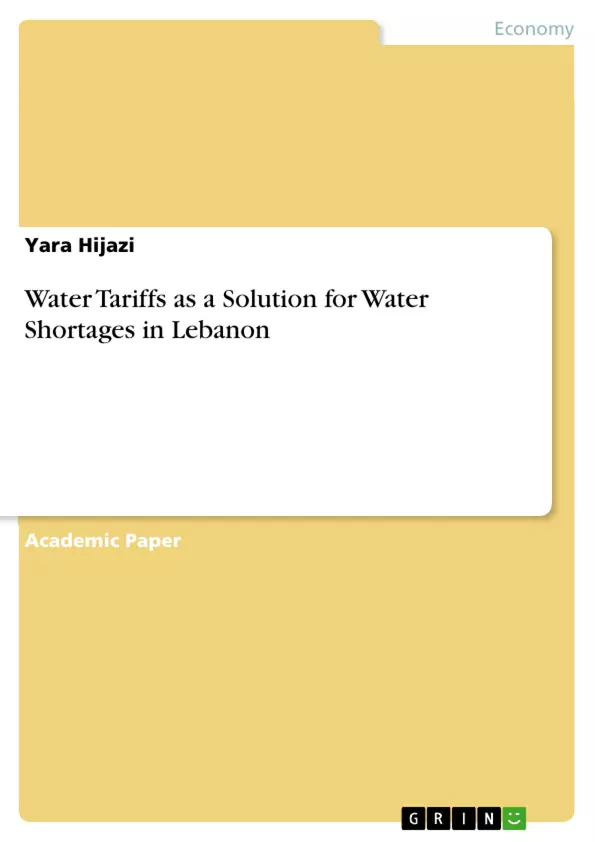This paper studies possible economic solutions to the water shortages in Lebanon. Chapter 2 mentions the current water situation and talks thoroughly about the reasons, effects, and previous attempts of solutions. Chapter 3 defines the theoretical approach of increasing block of water tariffs. Chapter 4 discusses the application and current situation of water meters and the challenges happening, and finally chapter 5 gives a final conclusion on whether this instrument is possible to achieve better water situation or not.
Inhaltsverzeichnis (Table of Contents)
- Introduction
- Water Situation in Lebanon
- Water Sources
- Problem
- Water Demand
- Institutions and Legislations
- Institutions
- Legislations
- Economic Instrument: Introducing Water Tariffs and increasing blocks: Theory and Practice
- Tariffs for Lebanon
- Former Trials
- Advantages
- Disadvantages
- Current Situation and implementation
- Former Trials
- Conclusion
Zielsetzung und Themenschwerpunkte (Objectives and Key Themes)
This paper aims to investigate the potential of implementing water tariffs as a solution to address water shortages in Lebanon. It explores the current water situation in Lebanon, analyzing the sources, challenges, and past attempts at solutions. Furthermore, the paper examines the theoretical framework of increasing block water tariffs and discusses its practical application within the Lebanese context. The analysis considers the current situation and implementation challenges associated with water metering.
- Water scarcity and mismanagement in Lebanon
- Economic instruments for water conservation, specifically water tariffs
- Increasing block tariffs as a mechanism for promoting water efficiency
- Challenges and opportunities for implementing water tariffs in Lebanon
- The potential impact of water tariffs on the Lebanese water sector
Zusammenfassung der Kapitel (Chapter Summaries)
- Introduction: This chapter provides a general overview of the global water crisis and highlights the importance of sustainable water management. It emphasizes the need for solutions to address water shortages, particularly in water-stressed regions like Lebanon.
- Water Situation in Lebanon: This chapter delves into the current water situation in Lebanon, focusing on its water sources, the problem of water mismanagement, water demand, and the institutional and legislative frameworks governing the water sector. It explores the challenges posed by factors such as population growth, industrialization, and inadequate wastewater treatment infrastructure.
- Economic Instrument: Introducing Water Tariffs and increasing blocks: Theory and Practice: This chapter introduces the theoretical framework of increasing block water tariffs as an economic instrument for promoting water conservation. It discusses the principles behind this approach and examines its effectiveness in different contexts.
- Tariffs for Lebanon: This chapter explores the application and current situation of water tariffs in Lebanon. It examines past trials of water tariffs, evaluating their advantages and disadvantages. The chapter also analyzes the current state of implementation and discusses the challenges associated with introducing and enforcing such measures.
Schlüsselwörter (Keywords)
This paper focuses on water scarcity, water management, water tariffs, increasing block tariffs, Lebanon, water conservation, water efficiency, wastewater treatment, and sustainable development. It explores the potential of economic instruments, particularly water tariffs, to address the challenges of water shortages in Lebanon.
Frequently Asked Questions
What is the main proposal to solve water shortages in Lebanon?
The paper investigates the implementation of economic instruments, specifically increasing block water tariffs, as a solution.
What causes water mismanagement in Lebanon?
Factors include population growth, industrialization, inadequate wastewater infrastructure, and weak legislative frameworks.
How do "increasing block tariffs" work?
This is a system where the unit price of water increases as consumption crosses certain thresholds, encouraging water efficiency and conservation.
What are the challenges of using water meters in Lebanon?
The paper discusses practical application challenges, including the current situation of infrastructure and difficulties in enforcing metering.
Has Lebanon tried similar water solutions before?
Yes, the paper evaluates former trials of water tariffs, analyzing their advantages and disadvantages for the Lebanese context.
- Citar trabajo
- Yara Hijazi (Autor), 2019, Water Tariffs as a Solution for Water Shortages in Lebanon, Múnich, GRIN Verlag, https://www.grin.com/document/1245732



